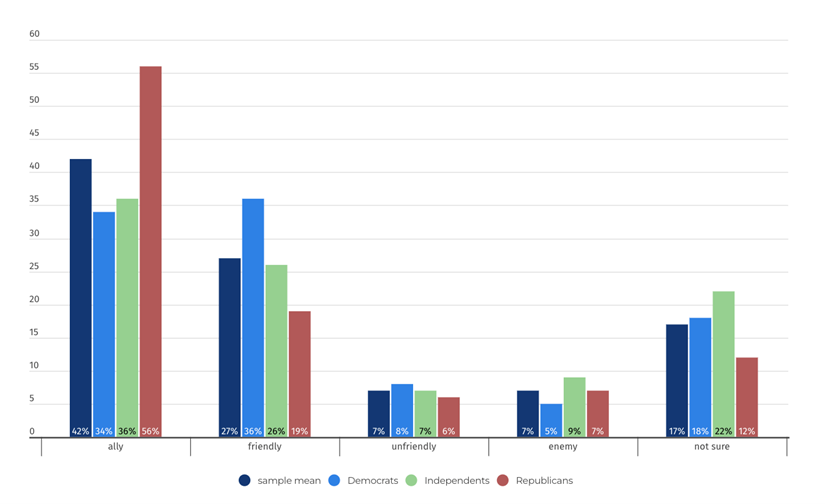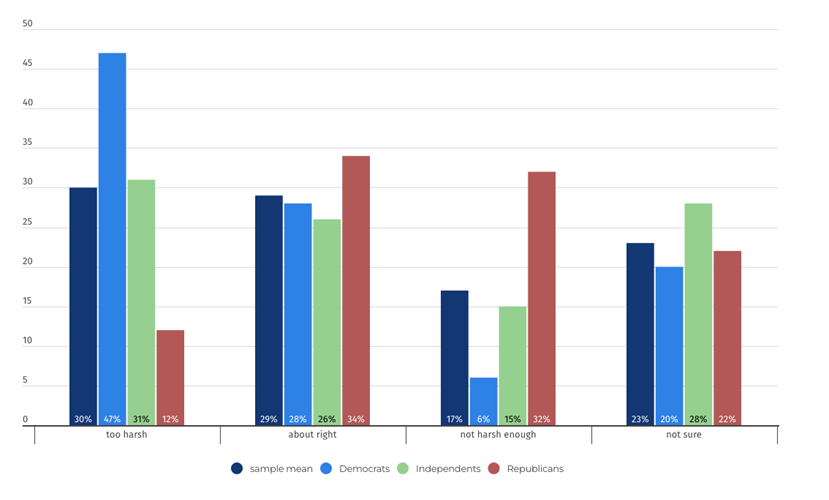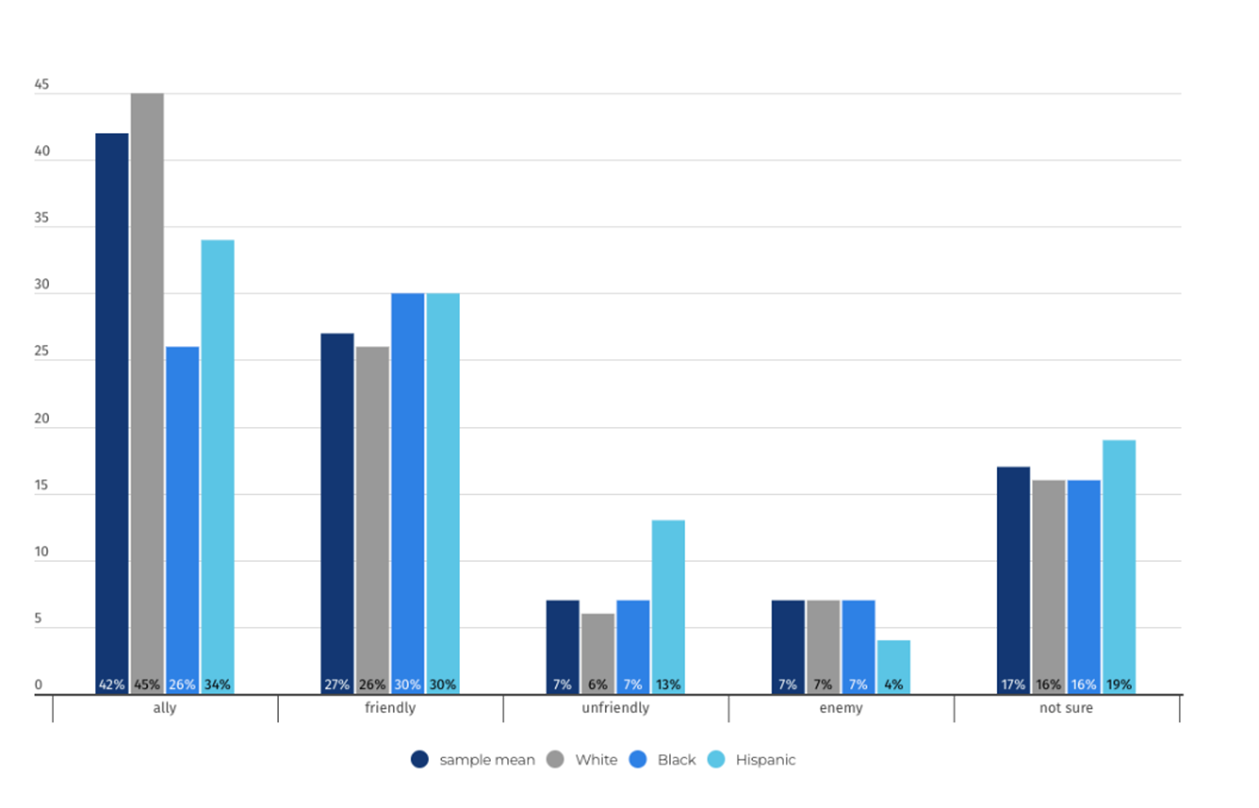Publications
INSS Insight No. 1835, March 12, 2024
The October 7th massacre and Israel’s subsequent military response in the Gaza Strip provoked significant protests throughout the West, opposing Israel’s military operation. Israel has received the full backing of the Biden administration, on both the military and diplomatic fronts, yet public opinion among the American public, while still supportive, has decreased as Israel’s ground operation in Gaza has continued and Palestinian casualties have mounted. Recent public opinion polling in the United States has underscored the polarizing support for Israel, with growing gaps between varying political orientations, young people, and persons of color, whose support for Israel has eroded. This diminishing support presents worrying signs for Israel’s special relationship with the United States. The following article analyzes public opinion surveys among the American public in response to Israel’s operation and attempts to identify trends that may affect the future of American public opinion toward Israel.
Hamas’s attack in the south of Israel, the deadliest since Israel’s founding, and the IDF’s military response initially elicited sympathy among the American public. Yet, as Israel expanded its operation in Gaza, public support has dipped. This can be seen with the Pew Research Center’s public opinion survey published on December 8, 2023. The results indicate that the majority of Republicans and Republican-leaning respondents (73%) and Democrats and Democrat-leaning respondents (62%) agree that Hamas has “a lot” of responsibility for the current war with Israel. However, when asked about the role of the Israeli government in the war, there is a larger gap between the two parties. 21% of Republicans and Republican-leaning respondents stated that the Israeli government is responsible for the war, whereas 50% of Democrats and Democrat-leaning respondents feel the same. Additionally, while 27% of Republicans claim the Israeli government has no responsibility, only 6% of Democrats agree with this sentiment. Another noteworthy gap is that young adults (ages 18–29) in both parties are less likely than older respondents to agree that Hamas bears the majority of the responsibility for the current war. In addition, 38% of adults under 35 agreed that Israel had “gone too far” with regards to its response to Hamas, compared to those aged 35 to 49 (27%), 50 to 64 (23%), and 65 and older (16%).
While the Democratic Party has historically been the political home for the vast majority of American Jews, the party’s support for Israel has declined over the past decade. According to a Gallup blog, between the years 2011 and 2014, Democratic support for Israel consistently sympathized more with Israel than with the Palestinians (53% to 58%), compared to the years 2019 and 2023 when less than half of the party (38% to 44%) sympathized more with Israel than the Palestinians. This diminishing support for Israel is particularly tied to the “millennial support” within the Democratic Party for the Palestinian cause; young Democrats overwhelmingly support the Palestinians, while older Democrats are more favorable to Israel. Even among younger Republicans and Independents, sympathy for Israel has declined, marking a sharp break from their older counterparts.
The CNN ORC polls of May 24–26, 2011 and November 16–18, 2012 tell an interesting story that allows for comparison over the course of the years and insights into the shifting attitudes on the Middle East conflict and Israel’s military actions against Hamas in Gaza. The 2012 pull was conducted during Operation Pillar of Defense. Between 2011-2012, support for Israel noticeably decreased, dropping from 67% in 2011 to 59% in 2012. Similarly, sympathy for Palestinians also experienced a decline, falling from 16% in 2011 to 13% in 2012. The rise in respondents expressing no opinion, from 3% in 2011 to 13% in 2012, suggests increased uncertainty or a neutral stance among the surveyed population.
The findings align closely with those reported by the Gallup survey conducted between November 1 and November 21, 2023. According to the results, approximately 50% of the individuals surveyed in the United States expressed approval of Israel’s military activities in the Hamas-controlled Gaza Strip, compared to 45% voicing disapproval. Notable differences emerged across various demographic groups regarding their stances on Israel’s military interventions. The data indicates that Republicans (71%), males (59%), individuals aged 55 and above (63%), and white adults (61%) generally endorse Israel’s actions in Gaza. In contrast, Democrats (63%), individuals under the age of 35 (67%), and persons from minority communities (64%) tend to disapprove, alongside a slim majority of women (52%). Democrats, young adults, individuals from minority backgrounds, and women are more likely to believe that the United States is not providing adequate humanitarian assistance to the Palestinians. Furthermore, they are more inclined to assert that the United States’ provision of humanitarian aid to the Palestinians falls short compared to its military assistance to Israel.
The most recent poll analyzed in this article is a joint effort between YouGov and the Economist, which was carried out on January 21–23, 2024. The results in terms of the attitude toward Israel (see figure 1) continue a trend seen in the other surveys. The results showed that 75% of Republicans, 62% of Independents, and 70% of Democrats (compared to the sample mean of 69%) viewed Israel favorably (ally or friendly). This is in contrast to 13% of Democrats, 16% of Independents, and 13% of Republicans (compared to the sample mean of 14%), who viewed Israel unfavorably (enemy or unfriendly). When asked about the harshness of the Israeli government’s response to Hamas, there were varying opinions (see figure 2). Despite the majority of Democrats viewing Israel in a positive light, 47% of the Democratic participants answered that the Israeli response in Gaza was too harsh, as did 31% of Independents and 12% of Republicans (compared to the sample mean of 30%). 28% of Democrats, 26% of Independents, and 34% Republicans believe that the reaction was “about right.” Conversely, 32% of Republicans, 15% of Independents, and 6% of Democrats believed that the reaction was not harsh enough.

Figure 1. “Do you consider Israel an ally, friendly, unfriendly, or an enemy?”

Figure 2. “Do you think that the Israeli government’s military response to the attack by Hamas has been . . . ?”
The 2024 poll by YouGov and the Economist additionally offers segmentation by ethnicity (persons of color). As highlighted in previous polls, there is a continuing divide between white respondents and persons of color when asked about Israel’s status as an ally to the United States. Of white respondents, 71% see Israel favorably while 56% of black respondents and 64% of Hispanic respondents feel the same (see figure 3).

Figure 3. “Do you consider Israel an ally, friendly, unfriendly, or an enemy?” Total sample compared with ethnicity.
The American Domestic Arena
Since the outbreak of the current war, President Biden has sought to navigate his position by supporting Israel in its fight to eliminate Hamas from Gaza, while also managing what has become a fractious relationship with Prime Minister Netanyahu and his right-wing government, which is extremely unpopular in liberal and democratic circles. For Biden, a self-identified Zionist, the American response has struck a balance between internal opposition toward American policy and outright sympathy toward the Palestinians within the Democratic Party. This, coupled with concerns over the policies of a far-right Israeli government, has played a significant role in causing the Americans to pressure Israel to uphold international law and provide significant humanitarian aid to civilians in Gaza. Biden’s strategy has focused both on upholding American interests as “the guardian” of the rules-based international order, pressing Israel to adhere to international norms with an eye on the polls, all while underscoring his efforts to push Israel to minimize Palestinian civilian casualties. The recent American decision to suspend Israeli purchases of M-16 and M-4 assault rifles in the wake of settler violence in the West Bank, as well as the sanctions of four settlers, aligns with the Biden administration’s recent conduct of seeking to support Israel while also trying to reduce tensions with the Palestinians.
The Biden administration’s policy toward Israel is directly linked to Washington’s plans—outlined before the outbreak of the war with Hamas—normalizing relations between Israel and Saudi Arabia. In addition, an integral part of the plan is Israel’s economic integration with the rest of the region. The American pressure on Israel to produce a plan for “the day after” the war is the first step in creating a pragmatic regional architecture. This will include significant investments in the Palestinian territories and a plan to rebuild a demilitarized Gaza, while reviving a roadmap for a two-state solution.
Biden’s support for Israel has already caused significant backlash within his own party, prompting calls for a ceasefire. In addition, Arab Americans, a significant and critical constituency for the Democrats in Michigan—a state that Biden won in 2020 by a mere 154,000 votes—have called for a boycott of the 2024 elections. For many progressive Democrats, the conflict between Israel and Hamas elicits comparisons to their own struggle against “white supremacy,” inserting American political rhetoric to the Middle East. Hamas has utilized this comparison to its benefit. In an interview with Vice News, Hamas leader Yahya Sinwar noted to his interviewer that the Palestinians were analogous to George Floyd, and that they “could not breathe since 1948.” The intersection of the Palestinian narrative together with narratives in favor of racial and social justice has become a prominent focus of left-wing opposition to Israel, particularly on college campuses.
With changing demographics in the United States, the Democratic Party has increasingly become identified as the party of college-educated elites and ethnic minorities. Biden owes his nomination in part to his overwhelming victory in the black-dominated South Carolina primary in 2020, thereby potentially causing considerable political risk in his support for Israel. An example was the October congressional resolution calling for a ceasefire between Israel and Hamas, supported by 18 congressional Democrats, all persons of color, symbolizing the generational and ideological divide within the party. As the polling data above has shown, younger Democrats, such as those who are now serving in the House of Representatives, are much more likely to support the Palestinians, further complicating the future of Israel’s long-established, bi-partisan base of support. A byproduct of this sentiment has been the discussions within the State Department regarding the potential US recognition of a demilitarized Palestinian state within the framework of a wider push for Middle East peace, a significant change in American policy on the Palestinian issue.
Conclusion
While the Biden administration has given Israel’s military response unprecedented backing, public opinion polls highlighting the support or lack thereof within the Democratic Party in an election year places pressure on policy decisions. It is incumbent on Israel to understand the internal factors at play in the American public discourse, as they affect the decisions made by the Biden administration and the future of American–Israel relations. Although this war will not stop the US elections, Israel must be aware of the implications of its activity within the American domestic arena.



